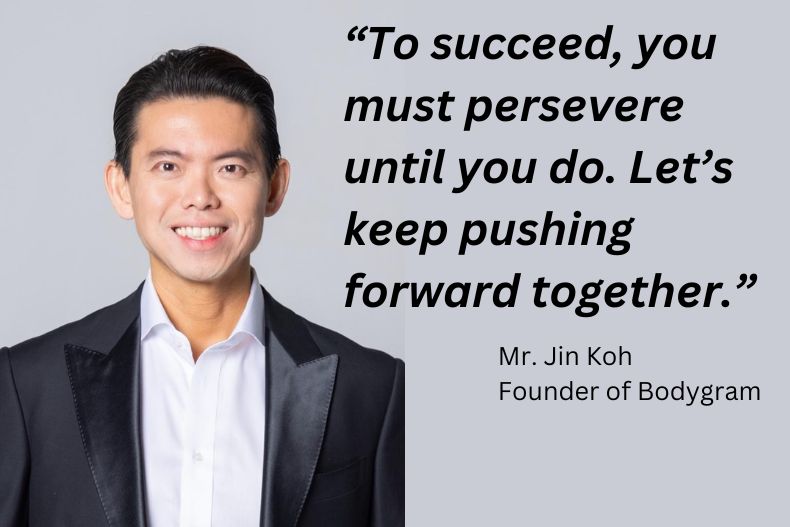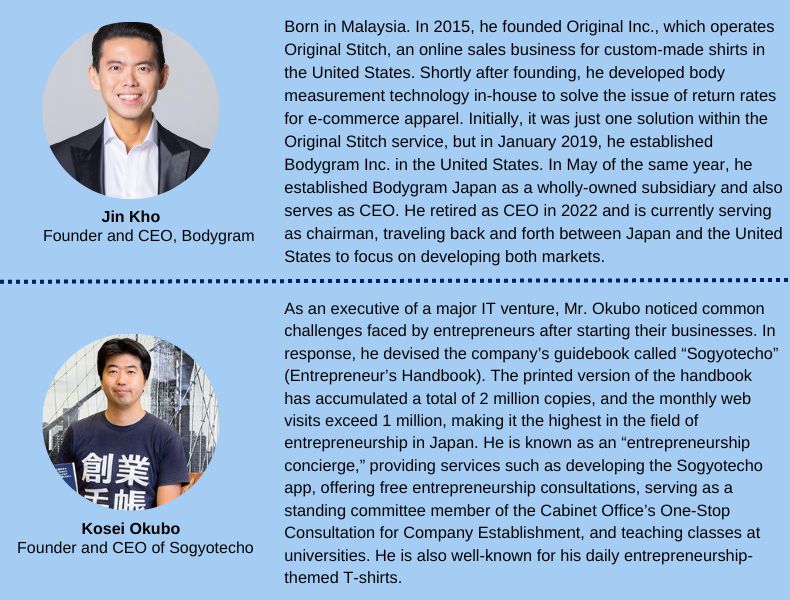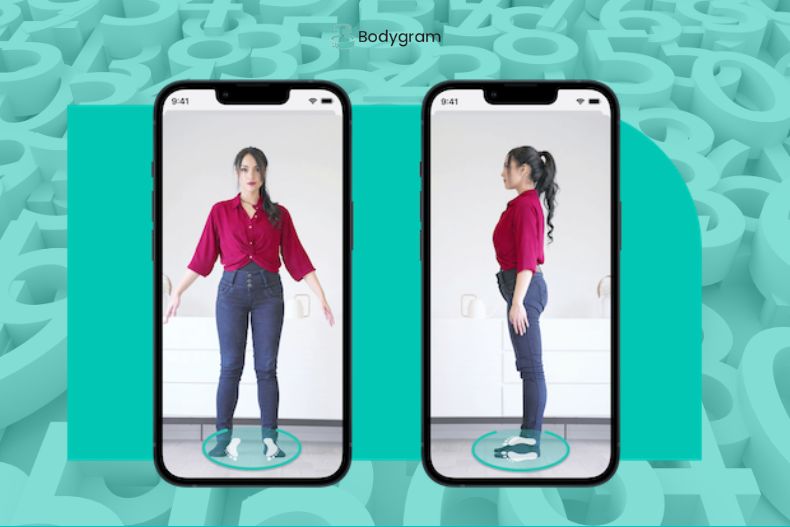From the perspective of SDGs (Sustainable Development Goals) and the circular economy, the popularity of fast fashion, characterized by mass production and waste, is starting to wane. Recently, there has been a growing focus on custom-made production, known as “made-to-order” manufacturing. Riding this trend, Bodygram offers a service that allows for quick and accurate body measurements using just a smartphone, even while fully clothed. This technology not only reduces costs across various industries but also enhances customer satisfaction.
In this interview, Mr. Kosei Okubo from Sogyotecho speaks with Mr. Jin Koh, the founder of Bodygram, about his multiple entrepreneurial experiences and the service overview of Bodygram.

Key Takeaways
- Future-Oriented Thinking: Jin emphasizes the importance of predicting future needs and leveraging those insights to generate business ideas. He advises young entrepreneurs to think ahead and engage with like-minded individuals to refine their concepts.
- Innovative Body Measurement Technology: Bodygram stands out for its use of AI and deep neural networks to provide precise body measurements through a mobile device, eliminating the need for traditional and costly body scanners.
- Sustainability in Fashion: Jin discusses how custom-made apparel, supported by accurate body measurement technology, aligns with SDGs by reducing inventory waste. This approach is seen as a sustainable alternative to mass production.
- New Service Launch: The “Future You” service allows users to visualize future body shapes based on their health and fitness goals, providing motivation and helping them achieve their desired body shape.
- Entrepreneurial Journey: Jin’s journey from starting his first company in Silicon Valley to developing Bodygram demonstrates the iterative process of learning from each venture, including dealing with challenges such as high return rates in custom apparel.
- Encouragement for Aspiring Entrepreneurs: Jin encourages aspiring entrepreneurs to have confidence in their ideas, learn from failures, and find joy in creating products and services that many people use and appreciate.
About the interviewer, Mr. Kosei Okubo and interviewee, Mr. Jin Koh

At age 19, he started his first company in Silicon Valley.
Okubo: Could you tell us about the process leading up to your first startup?
Jin: When I was young, I was so passionate about programming that I studied it on my own, spent my lunch money on programming books, and entered contests. I was also inspired by a book about entrepreneurship, which became a memorable read for me. As I read it, I dreamed of combining my programming skills with starting a business. At the age of 19, I launched my first startup in Silicon Valley.
Okubo: So, you started a business while still a student?
Jin: Yes. I started my business when I was a junior in college. At that time, I still took my exams at school, but I devoted most of my time to programming.
Okubo: Could you also tell us about the journey from your first startup to your current business?
Jin: At 19, I founded a company called ShareSpace, which provided a secure file-sharing service. I sold that company when I was 22. At 25 or 26, I started a new venture in virtual desktops. Then, at 29, I started another business in Japan, and at 33, I founded a B2C custom-made shirt e-commerce company that eventually led to my current service, Bodygram.
After selling the custom-made shirt e-commerce business, I spun off the size tech part that used body data into a separate company, which is now Bodygram.
After selling his predecessor business, he spun out his body data business and founded Bodygram.
Okubo : Why did you decide to spin off just the body data business?
Jin : Our predecessor company, Original Inc., was founded in Silicon Valley in 2015.
From my experience starting a business in the security field, I noticed that engineers tend to be indifferent to fashion and are reluctant to go to a department store to try on clothes , so I targeted this and started an online business selling made-to-order shirts.
Okubo: What was the unique selling point of your custom-made shirt business?
Jin: The business featured completely custom-made apparel with no inventory and allowed for 10 billion customization options. Customers could get shirts made to their preferred size, shape, and pattern. For example, someone might want an M size shirt but with a wider neck. We had a system to accommodate such requests. However, the biggest challenge was dealing with returns. Since the shirts were supposed to fit perfectly, the return rate was higher than anticipated.
Okubo : How did you solve that problem?
Jin : We developed a series of innovative apparel tech solutions, like a system that used photos of a person’s face and wrists to provide personal color analysis and styling, and an app that allowed for precise apparel measurements. However, through this process, we realized that the most important thing wasn’t just measuring shirt sizes, but accurately measuring the user’s body itself.
Okubo: It sounds like your various entrepreneurial experiences and technologies have all contributed to your current business.
Jin: Bodygram is my fourth startup. Throughout my life, I have learned and failed, but all those experiences have helped me make better decisions today.
Predicting the future three years from now reveals business opportunities
Okubo: Having started four businesses, could you share what you’ve learned about what to do and what not to do?
Jin: Many young people ask me how to come up with business ideas. My usual advice is to “look into the future.” Imagine yourself three years ahead and think about what people will need at that time. Consider what is required to meet those needs, and opportunities will arise from there. Instead of thinking in isolation, engage with groups of people who also think about the future. By exchanging ideas, you can refine your thoughts and generate better ideas.
Okubo: Are there differences in how you conduct business in the U.S., Japan, and Malaysia?
Jin: When I was in Malaysia, I was a minor and had not started any businesses. However, as you know, Malaysia is often compared to a “small Saudi Arabia” in terms of its limited natural resources but abundant business opportunities.
In the U.S., particularly in Silicon Valley, while it’s seen as the tech frontier, I’ve noticed a significant decentralization recently. New movements are happening around San Francisco, and there are tax incentives expanding in places like Miami and Texas.
Using AI technology to measure body weight faster and more accurately

Okubo: Bodygram’s service, which measures the body with just two photos and basic information, seems technically very advanced. What specifically makes it innovative?
Jin: When humans perform body measurements, there are inevitable errors and waiting times. Traditionally, expensive systems like body scanners were needed, which hindered the ability to scale the business. To solve this issue, Bodygram was the first company to incorporate the functionality of a scanner into a palm-sized mobile device. We utilize deep neural network (DNN) technology, an advanced form of AI, to mark points on the user’s body based on data and measure from within the actual body.
Okubo: With the shift towards SDGs, mass production and mass waste in apparel are being criticized. Is this trend lowering the barriers for custom-made clothing?
Jin: Custom-made clothing is indeed beneficial from an SDG perspective because it eliminates the need for inventory. However, it requires skilled tailors or staff with precise body measurement techniques. With Bodygram’s technology, we can achieve high-precision body measurements at a low cost. We anticipate the growth of fully online business models where measurements are taken via mobile devices and products are delivered directly to customers.
Note: Deep Neural Networks (DNN) – A technology that replicates the function of human brain neurons on a computer to achieve highly accurate results.
The only way to succeed in starting a business is to keep going until you succeed
Okubo: Most people can only accurately answer their height when it comes to their body measurements, so using AI for sizing is quite innovative.
Jin: I believe that hardware will continue to evolve, and as it does, we’ll be able to offer even better services.
Okubo: Are you considering applications outside the apparel industry?
Jin: Yes, we recently launched a new service called “Future You.” It allows users to scan their bodies and see a 3D avatar of their future physique based on target weights and other goals. This feature visualizes how your body will change over time, helping users set and achieve their fitness and health goals. People are not only interested in accurately measuring their current body but also in understanding what their future selves might look like.
Okubo: Lastly, could you share a message with our readers?
Jin: If you have a good idea and it’s something you are passionate about, have confidence and start your business. There will be failures, but each one is a learning experience. As entrepreneurs, we start businesses because we find joy in seeing many people use our technologies, services, or products. There will be sleepless nights and moments of self-doubt, where it’s hard to distinguish between right and wrong. However, to succeed, you must persevere until you do. Let’s keep pushing forward together.
Conclusion
Jin’s interview highlights the critical role of forward-thinking and innovation in successful entrepreneurship. By leveraging advanced AI technology, Bodygram provides precise and accessible body measurements, setting new standards in the fashion industry and beyond. Jin’s experience underscores the value of perseverance and continuous learning, inspiring others to pursue their entrepreneurial dreams with confidence and resilience. His journey reflects a blend of technological prowess and a deep understanding of market needs, paving the way for sustainable and impactful business solutions.
Disclaimer: This article is an English translation of the original content published on the website sogyotecho.jp, which is the parent company of the Founders Guide website. The translation aims to provide information to English-speaking readers while maintaining the essence of the original article. Please note that any discrepancies or inaccuracies in the translation are unintentional. For the most accurate and up-to-date information, kindly refer to the original article in Japanese on sogyotecho.jp